Guide

Page i
HYBRID JUSTICE
More than thirty years after the fall of the Pol Pot regime, a UN-backed tribunal, fusing Cambodian and international law, procedure, and personnel, was established to try key Khmer Rouge officials for atrocities committed in the late 1970s. In this definitive scholarly treatment of the Extraordinary Chambers in the Courts of Cambodia (ECCC) from legal and political perspectives, John D. Ciorciari and Anne Heindel examine the ECCC's institutional features, compare it to other hybrid and international criminal courts, evaluate its operations, and draw lessons for the future.
Ciorciari and Heindel begin by discussing the political factors and historical contingencies that led the United Nations and Cambodian Government to create a hybrid tribunal with a number of unique features. Next, they examine the tribunal's operations to date, focusing on how its institutional form has affected its various intended functions. They argue that many aspects of the ECCC's judicial proceedings have been broadly consistent with international standards and that the Court's in-country location has provided important benefits in terms of public outreach and victim participation. Nevertheless, the authors demonstrate that the ECCC's complex, divided institutional structure and wrangling between national and international actors have slowed the proceedings, contributed to administrative irregularities, led to due process concerns, and jeopardized the Court's public legitimacy and ability to leave a legacy of credible justice. Ciorciari and Heindel argue that the ECCC's experiences reveal many of the challenges of managing a mass crimes process, especially in the context of a hybrid court. They conclude with recommendations on measures that can be taken to meet some of those challenges going forward.
John D. Ciorciari is an assistant professor at the Gerald R. Ford School of Public Policy at the University of Michigan.
Anne Heindel is legal advisor to the Documentation Center of Cambodia.
Page ii
Law, Meaning, and Violence
The scope of Law, Meaning, and Violence is defined by the wide-ranging scholarly debates signaled by each of the words in the title. Those debates have taken place among and between lawyers, anthropologists, political theorists, sociologists, and historians, as well as literary and cultural critics. This series is intended to recognize the importance of such ongoing conversations about law, meaning, and violence as well as to encourage and further them.
Series Editors:
Martha Minow, Harvard Law School
Austin Sarat, Amherst College
RECENT TITLES IN THE SERIES
Hybrid Justice: The Extraordinary Chambers in the Courts of Cambodia, by John D. Ciorciari and Anne Heindel
The Justice of Mercy, by Linda Ross Meyer
Dying Inside: The HIV/AIDS Ward at Limestone Prison, by Benjamin Fleury-Steiner with Carla Crowder
Sacred Violence: Torture, Terror, and Sovereignty, by Paul W. Kahn
Punishment and Political Order, by Keally McBride
Lives of Lawyers Revisited: Transformation and Resilience in the Organizations of Practice, by Michael J. Kelly
Among the Lowest of the Dead: The Culture of Capital Punishment, by David Von Drehle
Punishing Schools: Fear and Citizenship in American Public Education, by William Lyons and Julie Drew
Suing the Gun Industry: A Battle at the Crossroads of Gun Control and Mass Torts, edited by Timothy D. Lytton
Transformative Justice: Israeli Identity on Trial, by Leora Bilsky
Jurors Stories of Death: How America's Death Penalty Invests in Inequality, by Benjamin Fleury-Steiner
The Jurisprudence of Emergency: Colonialism and the Rule of Law, by Nasser Hussain
Communities and Law: Politics and Cultures of Legal Identities, by Gad Barzilai
From Noose to Needle: Capital Punishment and the Late Liberal State, by Timothy V. Kaufman-Osborn
The Limits to Union: Same-Sex Marriage and the Politics of Civil Rights, by Jonathan Goldberg-Hiller
Pain, Death, and the Law, edited by Austin Sarat
Bad Boys: Public Schools in the Making of Black Masculinity, by Ann Arnett Ferguson
Whispered Consolations: Law and Narrative in African American Life, by Jon-Christian Suggs
Laws of the Postcolonial, edited by Eve Darian-Smith and Peter Fitzpatrick
Page iii
Hybrid Justice
THE EXTRAORDINARY CHAMBERS IN THE COURTS OF CAMBODIA
John D. Ciorciari and Anne Heindel
The University of Michigan Press
Ann Arbor
Page iv
Copyright by the University of Michigan 2014
All rights reserved
This book may not be reproduced, in whole or in part, including illustrations, in any form (beyond that copying permitted by Sections 107 and 108 of the U.S. Copyright Law and except by reviewers for the public press), without written permission from the publisher.
Published in the United States of America by
The University of Michigan Press
Manufactured in the United States of America
 Printed on acid-free paper
Printed on acid-free paper
2017 2016 2015 2014 4 3 2 1
A CIP catalog record for this book is available from the British Library.
Library of Congress Cataloging-in-Publication Data
Ciorciari, John D. (John David), author.
Hybrid justice : the extraordinary chambers in the courts of Cambodia / John D. Ciorciari and Anne Heindel.
pages cm. (Law, meaning, and violence)
Includes bibliographical references and index
ISBN 978-0-472-11930-1 (cloth : alk. paper) ISBN 978-0-472-12021-5 (e-book)
1. CourtsCambodia. 2. CourtsCambodiaCases. 3. Justice, Administration ofCambodia. I. Heindel, Anne, author. II. Title.
KNM1580.C56 2014
347.861'01dc23
2013040221
Page v
CONTENTS
Page vi Page vii
ACRONYMS
| ASEAN | Association of Southeast Asian Nations |
| BAKC | Bar Association of the Kingdom of Cambodia |
| CGDK | Coalition Government of Democratic Kampuchea (1980s) |
| CIJ | Co-Investigating Judges (ECCC) |
| CPC | Criminal Procedure Code (Cambodia) |
| CPK | Communist Party of Kampuchea |
| CPP | Cambodian People's Party |
| CSD | Center for Social Development |
| DC-Cam | Documentation Center of Cambodia |
| DESA | United Nations Department of Economic and Social Affairs |
| DK | Democratic Kampuchea |
| DSS | Defence Support Section (ECCC) |
| ECCC | Extraordinary Chambers in the Courts of Cambodia |
| ICC | International Criminal Court |
| ICCPR | International Covenant on Civil and Political Rights |
| ICTR | International Criminal Tribunal for Rwanda |
| ICTY | International Criminal Tribunal for the former Yugoslavia |
| JAC | Judicial Administration Committee (ECCC) |
| OA | Office of Administration (ECCC) |
| OCIJ | Office of the Co-Investigating Judges (ECCC) |
| OCP | Office of the Co-Prosecutors (ECCC) |
| OLA | Office of Legal Affairs (United Nations) |
| OSJI | Open Society Justice Initiative |
| PAS | Public Affairs Section (ECCC) |
| PRK |

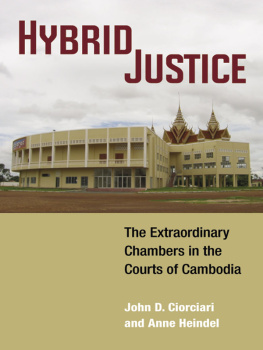
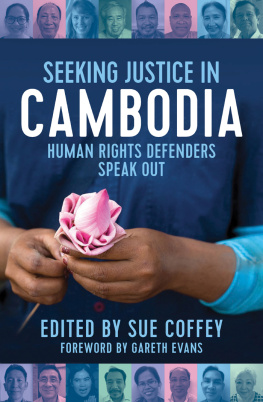
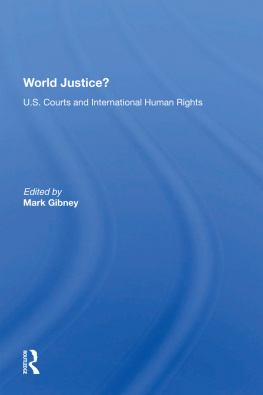
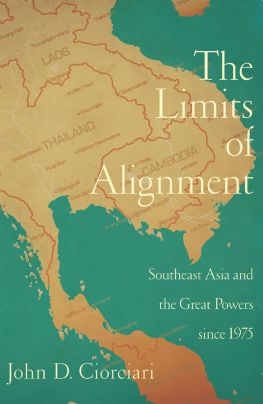
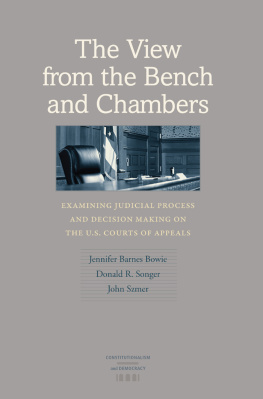
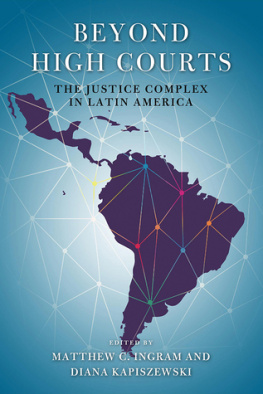
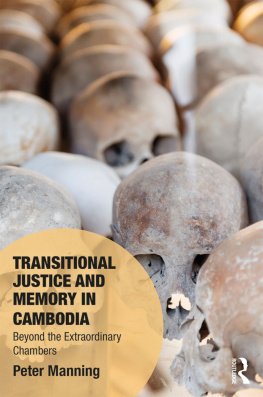
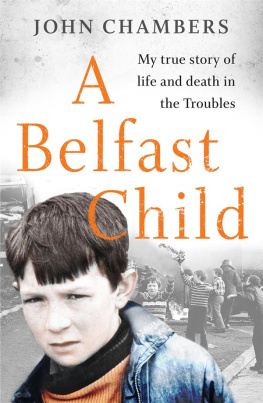
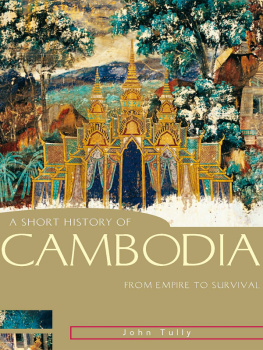
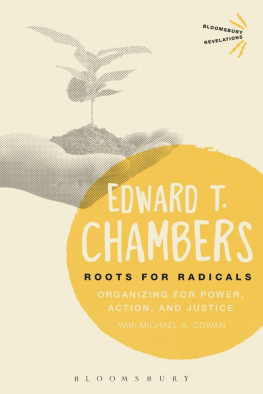

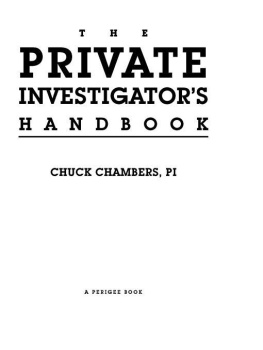
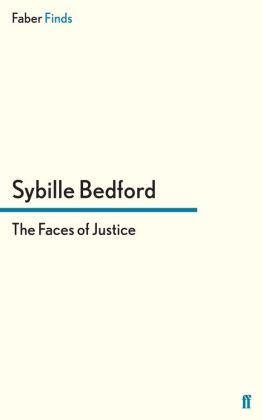
 Page i
Page i  Printed on acid-free paper
Printed on acid-free paper